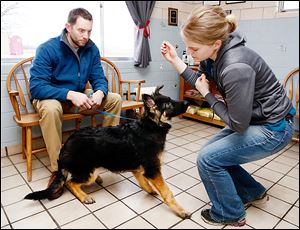
17-WEEK-OLD DOG MAY BE REHABILITATED
Fremont veterinarian giving pup that bit owner new life
17-week-old dog might get rehabilitated
3/28/2013
Dr. Ryan Zimmerman of Westview Veterinary Hospital in Fremont and his assistant, Emily Fray, work with Cain, a 17-week-old German Shepherd that bit its owner and sent her to the hospital with injuries. Dr. Zimmerman is hoping to rehabilitate the puppy.
FREMONT — A local veterinarian is hoping to get to the bottom of what caused a 17-week-old puppy to turn on its owner and send her to the hospital with several bite wounds.
Dr. Ryan Zimmerman of Westview Veterinary Hospital received the purebred German Shepherd puppy from the Sandusky County dog warden, who had picked it up at the request of its former owners, Barb and Phil Kerbel of Woodville Township. Dr. Zimmerman was supposed to euthanize the dog, but had other ideas.
“Our normal procedure in a situation like this is to euthanize the dog and and send it to be tested for rabies,” Sandusky County Dog Warden John Glass said. “But Dr. Zimmerman said he wanted to try to work with him.”
Mr. Glass contacted the Kerbels, who signed off on the request to not euthanize the puppy, but said they were not interested in the puppy coming back to live with them. The puppy, who the Kerbels called Cain, was obtained from a breeder in Fostoria about three weeks ago, Mr. Glass said.
The puppy might have had a previous bad experience with a cat that prompted the reaction before the attack, Mr. Glass said.
“The puppy imprinting period is from eight to 12 weeks old,” he said. “Anything a dog experiences — both good and bad — tends to stick with them.”
Mrs. Kerbel was taken by ambulance to Fremont Memorial Hospital on Sunday night after suffering injuries to her hands and leg, as well as a bite wound to her wrist, a sheriff deputy’s report said. Mr. Kerbel called 911 after he heard his wife scream for help. According to the report, when Mrs. Kerbel tried to put the 35-pound puppy outside, a cat ran through the kitchen and out the door, triggering the attack.
The Kerbels could not be reached for comment. The hospital switchboard operator said Tuesday Mrs. Kerbel had been released.
Dr. Zimmerman said the dog had not shown aggression in the 24 hours since he had been at the veterinary hospital. He and his staff will work with the puppy during a 10-day post-bite quarantine period to see if they can find his “hot buttons.” The dog has not yet reacted to a cat that walks around the clinic.
“He shows normal curiosity toward the cat,” Dr. Zimmerman said. “He’ll sit for treats. We’re not trying to push him; we want to ease into it. But so far, there’s not a lot of indications that this is a dog that’s dangerous from his behavior.”
Dr. Zimmerman has worked with many other behavioral issues with pets, he said. “In some cases, it’s just that the dog needs socialization,” he said. “We won’t adopt him out unless we are absolutely sure there’s no more risk with him ...”
Local animal trainers say proper socialization, especially early in a puppy’s life, is critical to ending up a with well-behaved adult dog.
John Brown, behavior technician at the Lucas County Dog Warden’s Office, said that it’s important to expose puppies to other dogs, cats, kids, bikes, and other people — anything they are going to be around — and give them positive reinforcement when they behave correctly.
Even gentle biting from a young puppy should not be discouraged, because this is how they learn bite inhibition — how much is too much. From 18 weeks and older, dogs should be taught not to bite at all, he said.
Although details are missing that might help Mr. Brown better theorize what could be the cause of the attack on Mrs. Kerbel, he said it is definitely not acceptable behavior under any circumstance. “For a 17-week-old puppy to do that much damage, it’s really concerning,” he said.
Jean Keating, who teaches dog training classes at the Toledo Area Humane Society, including those geared specifically to puppies, said the first weeks of a puppy’s life are the most critical.
Owners of puppies in classes sometimes get disturbed that their dogs are showing teeth and growling during their play with the other puppies in the class. But this “practice” fighting is part of how they learn control, she said.
“Puppy socialization is so important,” she said. “You can’t just play with a puppy in your back yard and have it turn out to be a great dog. They have to have experiences with other dogs and people during the first five to six weeks in order to develop bite control. They can’t go back and relearn it.”
Contact Tanya Irwin at: tirwin@theblade.com or 419-724-6066.